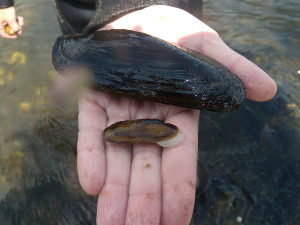About SSFP
About Us
Student Application
Subscribe to Our Newsletter
SSFP in the News
Members of Our Publishers Circle

In August 2021, spectaclecase mussels estimated to be over 100 years old were found by biologists working for the Wisconsin Department of Natural Resources (DNR), the University of Minnesota, and the National Park Service near the St. Croix Falls dam located in the St. Croix River. The U.S. Fish and Wildlife Service (FWS) has stated that in the past, these mussels—which can grow up to nine inches—were found in more than 44 streams across 14 states. Currently, this kind of mussels can be found in fewer than half the number of those streams in 11 states located primarily in the midwest and southeast.
Usually, the age of a mussel can be found by counting the number of growth rings on the shell. Due to the shells’ poor condition, the biologists assumed that the cluster had been there since 1907 when the river was dammed. DNR biologist Lisie Kitchel explained that the dam interrupted the spectaclecase mussels' reproductive process by preventing a fish necessary for their reproduction from traveling upstream beyond the dam.
The reproductive process begins when a fully developed female mussel releases glochidia, a larva that becomes attached to the gills or fins of a specific host fish to continue developing. The host is the key for the larvae to reach an ideal environment upstream in which they will continue their development into adult mussels.
After being examined by biologists, the living mussels were returned to their native habitat while the dead mussels’ shells were analyzed in order to calculate a more accurate age. Kitchel was amazed at the long lifespan of these surviving mussels, explaining that, although native mussels can live for long periods, the spectaclecase mussels were “pushing the limits.”
According to the FWS and the International Union for Conservation, these U.S. native freshwater mussels are now an endangered species. River damming, channelization, pollution, and invasive species have all had a role in endangering the spectaclecase mussels. But not only are these mussels endangered, 24 out of 50 of Wisconsin's native mussels—which are important to the ecosystem because of their role in filtering pollution from water and producing food for other animals—are endangered or in need of conservation.
[Sources: Newsweek; dnr.wisconsin.gov]
Loading Comments...